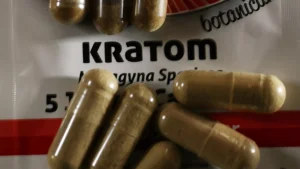
A substitute to a measure introduced by state Rep. Rick Townsend, R-St. Simons Island, will not keep kratom out of Georgia, but it will make it illegal for minors to buy or possess it.
The substitute, approved by the House in a 171 to 3 vote, restricts the sale of kratom to adults 21 years of age and older, and requires stores to keep it behind the counter or in a secure display accessible only by employees.
“It’s going to be harder for those teenaged kids to get a hold of it like they do now,” Townsend said. “You’re going to have to actually ask for it.”
Kratom, made from a plant native to Southeast Asia and Africa, can be a sedative or a stimulant depending on the dosage. It has been declared unsafe and ineffective by the Mayo Clinic, which has noted some users develop cravings severe enough that they require treatments similar to ones given to people with opioid use disorder.
Labeled a “drug of concern” by the Drug Enforcement Administration, kratom is illegal in Alabama, Arkansas, Indiana, Rhode Island, Vermont and Wisconsin.
Townsend’s original bill sought to make it illegal in Georgia.
“I hit a lot of resistance,” Townsend said. “There was pushback from the other side.”
Among those opposed to the measure in its initial form were veterans who said kratom provided relief from pain and helped with other issues.
“It’s a billion dollar industry,” Townsend said. “They had the money to fight it.”
The substitute carries other requirements. Kratom cannot be ingested via a heating element or vaporizing mechanism such as an electronic cigarette.
“They will now know what concentration they’re getting, what dosage they’re getting,” Townsend said. “Right now you’re not sure if it’s a weak dose, a strong does or whatever.”
Townsend said the medical community was behind his bill, as well as mental health advocates and the University of Georgia College of Pharmacy.
Under the House version, store employees violating the law would be guilty of a misdemeanor of a high and aggravated nature on a first conviction. A second conviction would constitute a felony punishable by one to 15 years in prison or a fine not to exceed $100,000, or both.
~
- By HANK ROWLAND The Brunswick News







